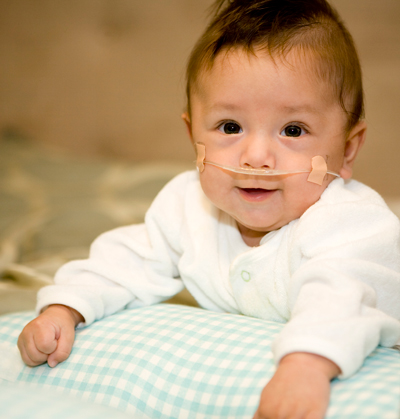Infant Complex Care Clinic
 The Kentucky Children’s Hospital Infant Complex Care Clinic provides medical and developmental follow-up care for infants and young children up to age 5 with medical complexity. This clinic, in collaboration with your child’s primary care provider, serves as a medical home away from home to help coordinate your child’s care.
The Kentucky Children’s Hospital Infant Complex Care Clinic provides medical and developmental follow-up care for infants and young children up to age 5 with medical complexity. This clinic, in collaboration with your child’s primary care provider, serves as a medical home away from home to help coordinate your child’s care.
Support for your family
The Infant Complex Care Clinic supports you and your child by:
- Easing the transition from hospital (NICU, PICU, PCICU or pediatric floor) to home.
- Assisting your child’s primary care provider in caring for their special medical and developmental needs.
- Providing you with access to a team member by cell phone to discuss questions or concerns about your child’s care.
- Helping you avoid unnecessary emergency room visits.
- Preventing hospital readmission.
- Limiting the number of subspecialist appointments in the immediate period after going home (slowly introducing as needed).
The schedule for medical and developmental follow-up is tailored to meet the needs of each individual child. Each child is evaluated by members of a multidisciplinary team that includes:
- A physician.
- Nurse practitioner.
- Dietitian.
- Physical therapist.
- Speech-language pathologist.
- Occupational therapist.
- Feeding specialist.
- Social worker.
A nurse navigator serves as the contact person for caregivers and primary care providers and is available by cell phone. Follow-up also includes periodic developmental assessments and referral for appropriate intervention services.
If your child needs to be admitted to the hospital again, the Complex Care team will provide continuity and support to your family throughout the hospitalization and assist with discharge planning.
Patient referrals
For patient appointments, please ask your primary care provider or pediatrician to make a referral.
Health care providers, please visit our referral page to refer your patient to this service.
Our patients
Infants and young children with medical complexity include those with:
- Moderate to severe chronic lung disease.
- Dependence on such technology as a tracheostomy, ventilator, feeding tube, ostomy or ventriculoperitoneal shunt.
- Chronic medical conditions that involve three or more organ systems and require subspecialty follow-up.
- Genetic conditions such as Down syndrome, Prader-Willi syndrome and trisomy 18.
- Cerebral palsy.
- Spina bifida.


